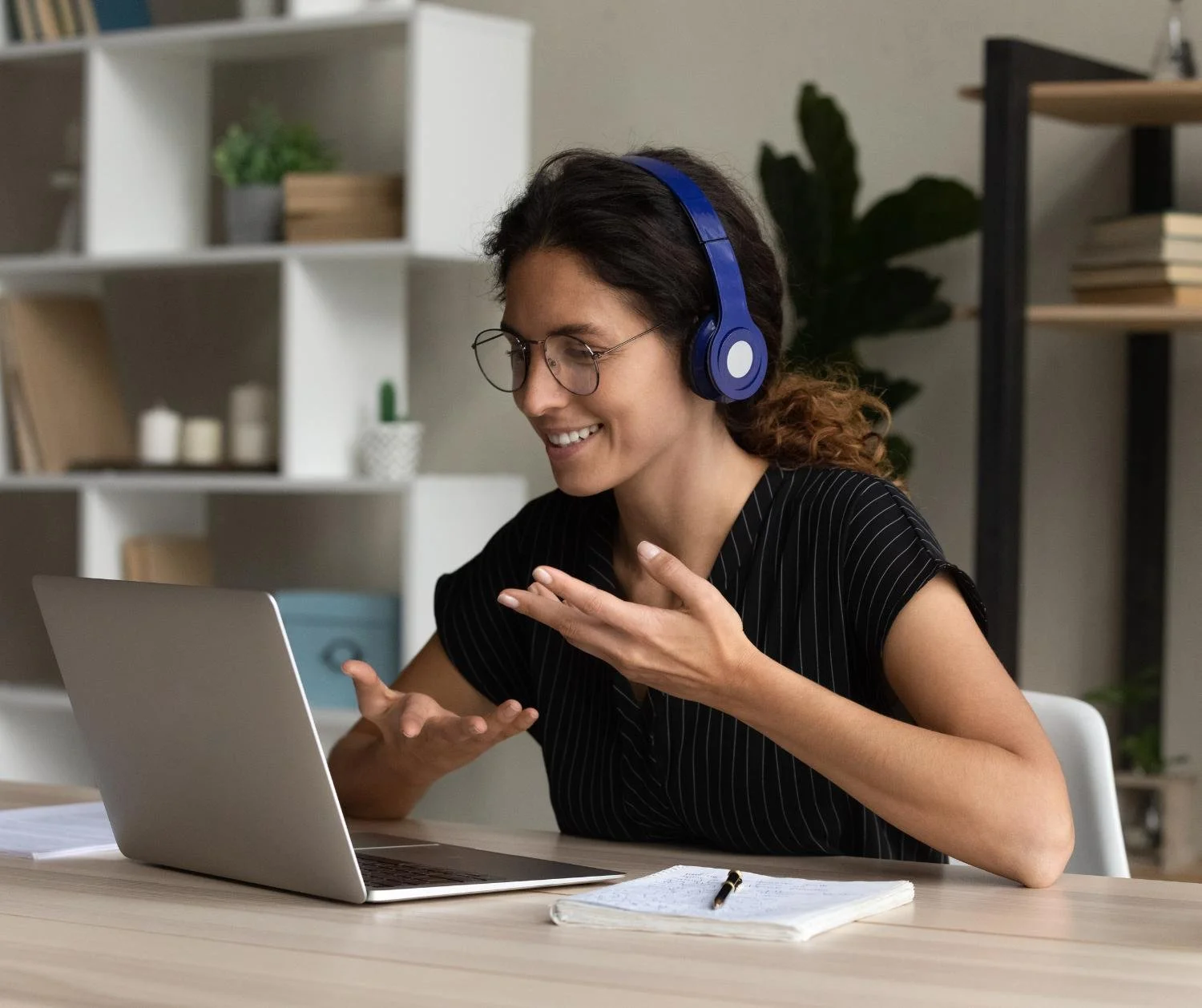Becoming a Better Listener with ADHD: Strategies for Adults
For adults with Attention Deficit Hyperactivity Disorder (ADHD), listening can feel like one of the hardest parts of communication. Conversations move quickly, distractions can make paying attention challenging, and the urge to jump in can interrupt the flow. These problems can strain relationships, create misunderstandings at work, and make it harder to connect with colleagues, clients, and teams.
Improving listening skills has a direct impact on communication, trust, and success in both professional and personal settings. With the right tools, adults can improve attention, reduce frustration, and strengthen their ability to be fully present in conversations.
Key Takeaways:
ADHD listening skills adults: Listening challenges often come from difficulties with attention, working memory, and impulse control.
Vital listening skills: Strengthening active listening, mindful listening, and note-taking techniques helps adults with ADHD stay engaged and understand key points.
Practice listening: Small, consistent efforts such as repeating back information or asking clarifying questions build stronger communication habits over time.
Better listening: Coaching and structured strategies help adults with ADHD improve focus, confidence, and clarity in conversations.
Active listening techniques: Making eye contact, observing facial expressions, and pausing before responding reduce interruptions and improve trust in communication.
What ADHD Looks Like in Adults
Why Listening Can Be Hard for Adults with ADHD
Common Listening Challenges for Adults with ADHD
How to Know if You Need Coaching for Effective Communication
Practical Strategies to Improve Listening Skills
What Coaching Looks Like for Listening with ADHD
Frequently Asked Questions About ADHD Listening Skills
How Connected Speech Pathology Helps Adults with ADHD Improve Communication
What ADHD Looks Like in Adults
ADHD is a neurodevelopmental condition that impacts executive functioning, attention, and self-regulation. It is diagnosed through a comprehensive assessment that may include interviews, questionnaires, and reports from both the individual and close contacts. For adults with ADHD in professional environments, these symptoms often surface in communication styles, presentation skills, and the ability to manage conversations effectively.
Executive functioning challenges are common and may include difficulty organizing tasks, time management struggles, forgetfulness, and difficulty maintaining focus during conversations. These patterns can affect professional communication, making it harder to build trust, articulate a clear message, or communicate confidently with colleagues and clients. Distraction can also disrupt listening skills, which impacts presence and credibility in business and leadership settings.
ADHD is managed through strategies such as behavioral methods, coaching, training programs, and, when appropriate, medical treatment. For professionals, executive function coaching and communication training support the development of skills that improve listening, clarity, and confidence.
ADHD and Communication Difficulties in Adults
Check out our blog on overcoming ADHD and communication difficulties in adults for more information!
Why Listening Can Be Hard for Adults with ADHD
Listening is a complex skill that relies on attention, working memory, and impulse control, areas often impacted by ADHD. When executive functioning is disrupted, it becomes harder to hold onto information, filter distractions, and resist the urge to respond too quickly.
ADHD symptoms such as distractibility, forgetfulness, and mental restlessness interfere with the ability to process what a person is saying in real time. Instead of taking in the full message, the ADHD brain may jump ahead, tune out, or lose track of important ideas, which may create gaps in understanding and make conversations more difficult to follow.
By recognizing that listening challenges are linked to executive functioning, adults with ADHD can begin using targeted strategies to improve focus and communication skills.
Common Listening Challenges for Adults with ADHD
For many adults with ADHD, listening struggles appear in both professional communication and personal relationships. These challenges make it harder to build vital listening skills and practice active listening consistently:
Difficulty staying engaged: Adults often struggle to develop strong listening skills due to their busy minds and tendency to think unrelated thoughts.
Interrupting or responding too quickly: Impulsivity disrupts the flow of conversation and prevents the listener from using active listening techniques like pausing before speaking.
Missing important details in professional settings: Adults with ADHD may overlook main points during meetings, presentations, or team discussions, which affects clarity and credibility.
Breakdowns in personal relationships: A conversation partner may feel unheard when attention shifts away, highlighting the need for better listening habits.
Feeling like a “movie playing” in the mind: Competing thoughts pull focus from the person talking, which makes it challenging to practice listening with full attention.
Talking nonstop to stay engaged: Some adults overtalk as a way to keep themselves focused, while others avoid conversations because listening feels exhausting.
Focusing on all the colorful details instead of the main message: Visual thinkers may notice all the details but miss the story’s key points, weakening overall communication.
Impact on confidence and communication skills: These listening challenges reduce trust, presence, and the ability to connect effectively with colleagues, clients, and teams.
How to Know if You Need Coaching for Effective Communication
Coaching becomes valuable when communication challenges consistently affect work, relationships, or confidence. If you often miss important details, lose focus during conversations, or feel like your conversation partner leaves without feeling heard, communication coaching may be the right next step.
You might benefit from communication coaching if:
Conversations leave you feeling overwhelmed or frustrated
You struggle to stay engaged and avoid drifting into unrelated thoughts
Colleagues or clients point out missed key points during meetings or presentations
Personal relationships suffer because you interrupt or talk a lot to stay focused
Listening feels so draining that you avoid long conversations altogether
Listening is a skill, and adults with ADHD can develop it through structured practice. Communication coaching strengthens communication, presence, and credibility in both career and personal life.
Practical Strategies to Improve Listening Skills
Becoming a better listener requires structure and practice. These strategies help strengthen active listening and improve communication in both professional and personal relationships.
Minimize Distractions
People with ADHD are easily distracted, which makes it harder to give full attention to the person talking. Choosing a quiet space and turning off notifications helps focus on what the conversation partner is saying. These steps also help you avoid focusing on outside noise or interruptions.
Use Active Listening Techniques
Maintain eye contact, notice facial expressions, and face the speaker directly to stay engaged. Repeating key points or asking follow-up questions helps keep your mind focused on what is being said. Short responses such as “uh-huh” or “I see” act as brief words of encouragement, showing you are listening and inviting the speaker to continue. You can also add polite comments to connect without interrupting.
Break Down Information
Long explanations often lead to missed main points. Taking notes captures the colorful details without losing the message. Requesting short, clear instructions also makes it easier to understand and remember. Try writing down only one main idea per line, then add the following sentence underneath to capture supporting details.
Practice Mindful Listening
Focus on the speaker’s words, tone, and voice to stay in the moment. Pausing before responding reduces impulsive interruptions, a common ADHD symptom. Practicing this in daily interactions creates stronger communication habits.
With consistent practice in listening, adults with ADHD can improve focus, build trust, and strengthen connections with colleagues, clients, and teams. Other strategies, such as setting reminders or using visual cues, can also support better listening habits.
What Coaching Looks Like for Listening with ADHD
A communication coach helps identify patterns, such as interrupting or mind wandering, that divert attention from the main points. From there, strategies are introduced to strengthen the ability to actively listen, remain interested, and respond with clarity. The result is better listening and more effective communication.
Sessions may include role-play exercises, note-taking, mindful pauses, and feedback on active listening techniques. These activities give adults the chance to practice listening in real-world scenarios, which makes the skills easier to apply in daily conversations. Over time, this practice reduces missed key points, strengthens presence, and improves both personal and professional interactions.
Because listening depends on executive functioning skills such as working memory, self-control, and organization, communication coaching also addresses these areas directly. Adults with ADHD learn how to manage distractions, break information into smaller steps, and use supports like written reminders.
By strengthening executive functioning alongside listening, communication coaching builds confidence, credibility, and a stronger presence in conversations across work and personal life.
Frequently Asked Questions About ADHD Listening Skills
1. Does ADHD affect listening skills?
ADHD symptoms such as distractibility, impulsivity, and working memory challenges make it harder to stay engaged and give full attention to the person talking. Adults with ADHD may lose track of key points or shift into unrelated thoughts.
2. Do people with ADHD struggle with conversations?
Many adults with ADHD find conversations difficult. They may interrupt, be overly conversant, or engage in non-stop talk, or focus more on their own thoughts than the speaker’s words. These patterns can leave conversation partners feeling unheard or overlooked, leading to awkward social interactions.
3. How can I actively listen with ADHD?
Choose quiet spaces, silence devices, and minimize distractions. Actively listen by making eye contact, repeating key points, and asking follow-up questions. Taking notes, breaking down information, and pausing before responding also help with focus and clarity.
4. What ADHD symptoms affect listening?
Examples of symptoms that affect listening include distractibility, forgetfulness, and impulsivity. These symptoms can lead to missed key points, frequent interruptions, and difficulty following the flow of a discussion.
How Connected Speech Pathology Helps Adults with ADHD Improve Communication
Connected Speech Pathology offers communication and executive function coaching designed to strengthen communication skills for adults with ADHD. Our services help adults develop vital listening skills, practice active listening techniques, and build strategies that make conversations clearer and more effective.
Sessions provide practical methods for managing distractions, identifying key points, and practicing mindful listening in real time. We also address executive functioning challenges such as working memory, impulse control, and organization, since these skills support listening and overall communication.
With support from a communication specialist, professionals strengthen confidence, presence, and clarity in conversations, meetings, and presentations. These improvements help adults with ADHD connect with colleagues, clients, and teams while expressing their own voice with credibility and influence.
Summary
Listening is a skill that can improve with consistent practice and targeted strategies. For adults with ADHD, strengthening vital listening skills supports better focus, clarity, and confidence in conversations. Small, daily changes, such as minimizing distractions, practicing active listening, and breaking down complex information, make communication more manageable.
With consistent practice in listening, adults with ADHD can build better listening habits that support stronger connections, improve professional presence, and make interactions more effective in work and personal life.
About the Author
Allison Geller is a communication coach, speech-language pathologist, and founder of Connected Speech Pathology, an international online practice providing professional communication coaching and speech therapy for children, teens, and adults. With more than two decades of experience, she has worked in medical and educational settings, published research on aphasia, and leads a team of specialists helping clients improve skills in public speaking, vocal presence, accent clarity, articulation, language, fluency, and interpersonal communication.











